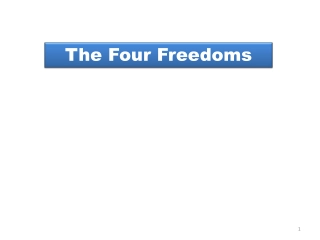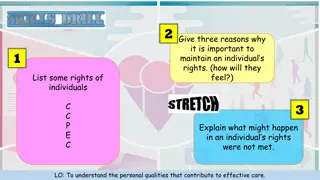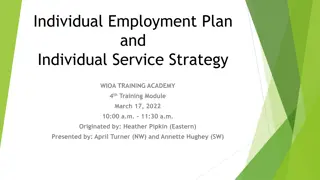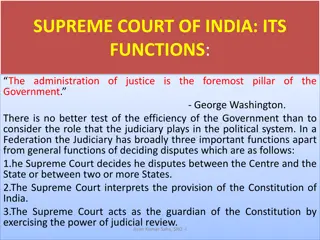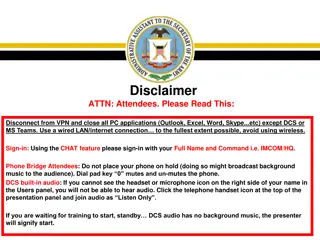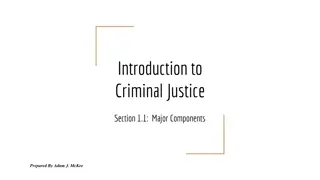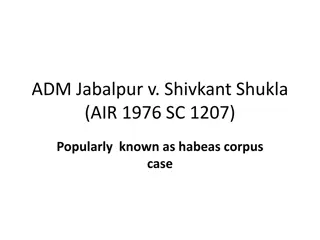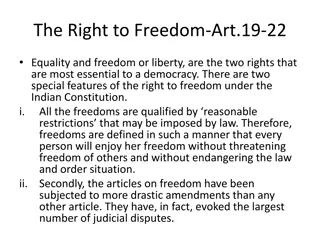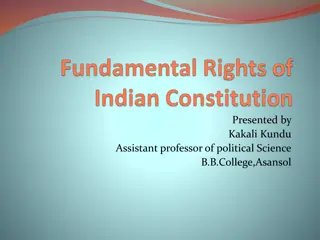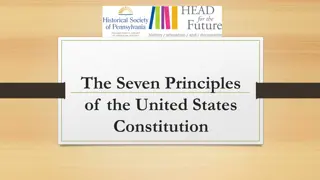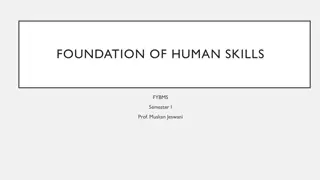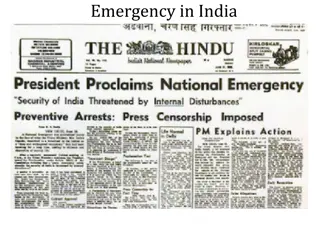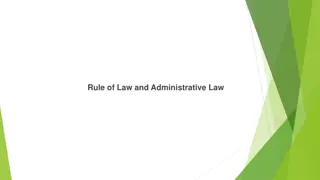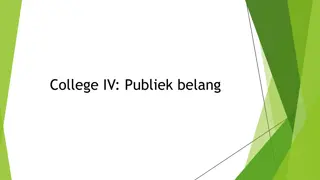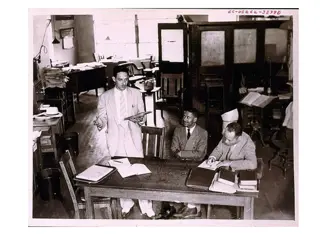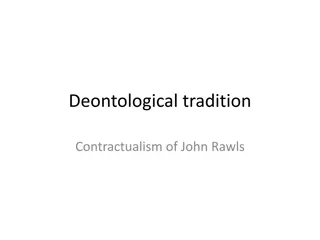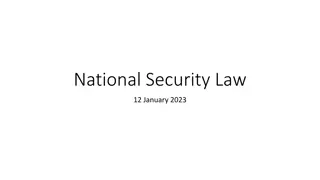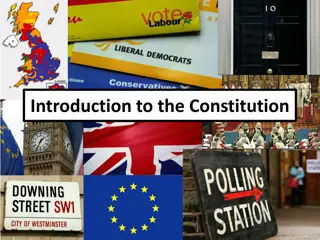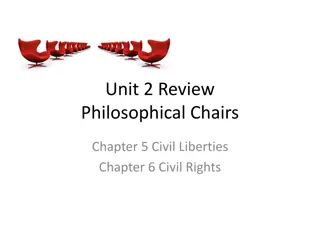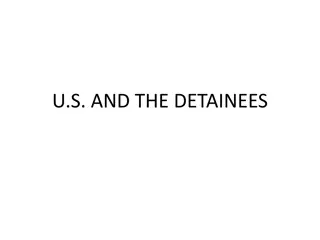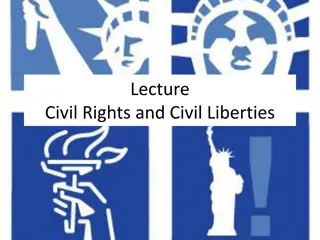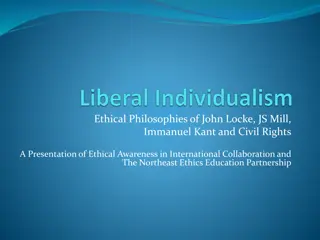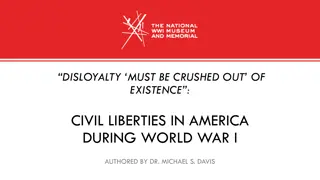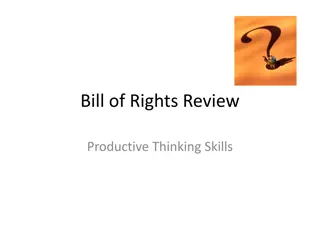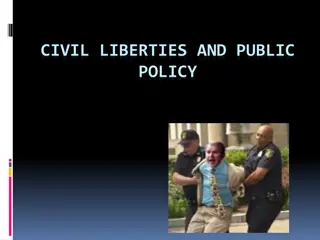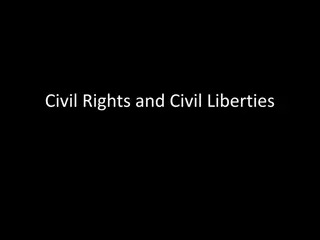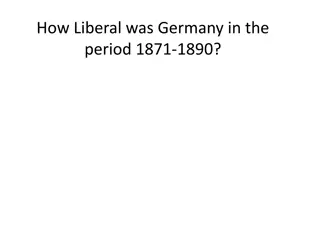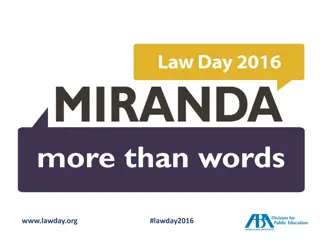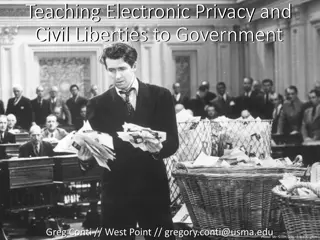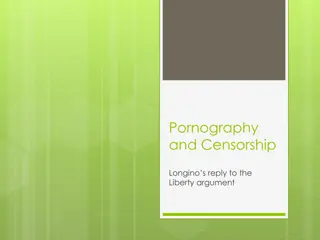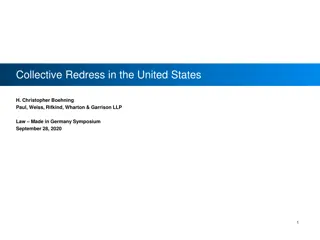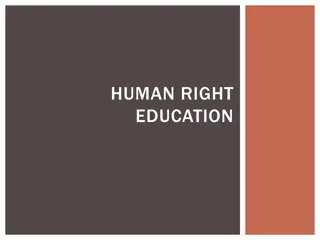Obscenity, Literature & Law
Delve into the interplay between obscenity, literature, and law, tracing the history of censorship in English law, landmark cases like the Lady Chatterley Trial, and the contemporary landscape of obscenity in legal frameworks. Discover the nuances of freedom of expression, diverse authorship in lite
0 views • 25 slides
The Four Freedoms
Delve into "The Four Freedoms" concept advocated by novelist1 and former US President Franklin D. Roosevelt, encapsulating freedom of speech and worship, and freedom from want and fear. This vision symbolizes the ideals of a democratic society and remains relevant in contemporary discussions on righ
0 views • 23 slides
A Long History of Inequality. Civil Rights & Civil Liberties.
Explore the complex history of inequality in the United States, from the Civil Rights and Civil Liberties amendments to the Reconstruction era. Learn about the limits placed on government, the significance of the 14th Amendment, and the challenges faced during the Reconstruction period, including th
2 views • 12 slides
Importance of Maintaining Individual Rights in Effective Care
Recognizing and upholding an individual's rights is crucial for providing effective care. It ensures the individual feels respected, valued, and supported, contributing to a trusting relationship. Failure to meet these rights can lead to negative consequences impacting the individual's well-being an
0 views • 32 slides
Understanding Individual Employment Plan (IEP) and Individual Service Strategy (ISS) in WIOA Training Academy
Individual Employment Plan (IEP) and Individual Service Strategy (ISS) are essential components of the WIOA Training Academy, tailored to meet the career needs of participants under various WIOA programs. IEPs focus on personalized career services for adults and dislocated workers, while ISSs are sp
1 views • 23 slides
Functions of the Supreme Court of India: Upholding Justice and Constitutional Rights
The Supreme Court of India plays a crucial role in the government by resolving disputes, interpreting the Constitution, and safeguarding individual liberties. It exercises various functions including original jurisdiction, appellate jurisdiction, advisory jurisdiction, acting as a Court of Records,
1 views • 25 slides
Army Records Management Virtual Symposium
Army Records Management-FOIA-Privacy-Civil Liberties Virtual Symposium will cover topics such as ARCIS, records retention schedules, record transfers, and accessing ARCIS accounts. Attendees are required to disconnect from VPN, use wired LAN, and follow specific guidelines for audio and phone usage
0 views • 21 slides
Evolution of Citizenship in Liberal Democracy
Citizenship within liberal democracy entails equal rights, duties, liberties, and constraints for individuals within a political community. The entrenchment of civil and political rights has shaped the struggle for membership and participation in political communities. Civil rights, essential for in
1 views • 11 slides
Overview of Criminal Justice System Components in the United States
The criminal justice system in the United States comprises various systems at state and federal levels. It consists of major components - Police, Courts, Corrections - bound by the Rule of Law and the Constitution. The Courts interpret laws and uphold civil liberties, with remedies available for vio
0 views • 28 slides
ADM Jabalpur v. Shivkant Shukla: Habeas Corpus Case Analysis
During the Emergency in 1975, the ADM Jabalpur v. Shivkant Shukla case examined the suspension of certain fundamental rights by the Indian government. The issue revolved around the legality of detentions under preventive laws and the right to habeas corpus. The Supreme Court's decision in this case
0 views • 13 slides
Essentials of Democracy: The Right to Freedom under the Indian Constitution
Equality and freedom are crucial components of any democracy, with the right to freedom holding special significance in the Indian Constitution. This right is characterized by qualifications termed as 'reasonable restrictions', ensuring a delicate balance between individual liberties and societal in
1 views • 7 slides
Understanding Fundamental Rights in the Indian Constitution
Fundamental rights are crucial for developing an individual's personality and dignity in society. The Indian Constitution grants six fundamental rights, including equality, freedom, and protection against exploitation. Despite certain limitations, these rights are essential for upholding individual
0 views • 10 slides
The Seven Principles of the United States Constitution Explained
The United States Constitution is based on seven key principles: Popular Sovereignty, Republicanism, Limited Government, Federalism, Separation of Powers, Checks and Balances, and Individual Rights. These principles outline the foundation of the American government, emphasizing the importance of cit
0 views • 9 slides
Understanding Human Nature and Individual Differences in Foundation of Human Skills
Explore the foundational concepts of human behavior, individual differences, and organizational culture in the study of human skills. Delve into topics such as human nature, personality, attitudes, intelligence, and learning in Prof. Muskan Jeswani's course. Understand the significance of inter- and
0 views • 11 slides
Emergency Provisions in the Indian Constitution: A Historical Overview
The emergency provisions in the Indian Constitution, including National/War Emergency under Article 352 and Constitutional Emergency in States under Article 356, have had significant historical implications. The period of Emergency declared from June 25, 1975, to March 21, 1977, during Indira Gandhi
0 views • 7 slides
Evolution and Criticisms of the Rule of Law
The rule of law, originating from classical Greece and emphasized throughout history, ensures equality before the law and limits arbitrary power. A.V. Dicey's three principles summarize this concept, emphasizing accountability for all, including government officials. While criticized for its limitat
0 views • 9 slides
Understanding the Importance of the Bill of Rights for Ensuring Liberty in the United States
The Bill of Rights, ratified in 1791, plays a crucial role in limiting the power of the American government and safeguarding the liberties of its citizens. Understanding the origin, application, and challenges to each amendment provides insight into the essential protections enshrined in the Constit
0 views • 15 slides
Understanding the Importance of Public Interest in Society
Exploring the concept of public interest as it relates to national security, public safety, prevention of disorder and crime, and the protection of individual rights and freedoms. Highlighting key considerations such as the role of law, democratic principles, and the balance between maintaining orde
0 views • 18 slides
Liberal Democracy and Citizenship: Rights, Duties, and Participation
Citizenship in liberal democracies entails equal rights, duties, liberties, and constraints, with a focus on civil and political rights. The entrenchment of these rights has been key in establishing popular sovereignty and individual autonomy. Civil rights, developed in the 18th century, centered on
2 views • 16 slides
Albanian Rehabilitation Centre for Trauma and Torture (ARCT) - Supporting Victims Since 1994
The Albanian Rehabilitation Centre for Trauma and Torture (ARCT) is a non-profit, non-political, and non-governmental organization in Albania dedicated to rehabilitating torture victims and preventing torture. Established in 1994, ARCT has been actively involved in supporting victims through various
1 views • 18 slides
Evolution of Constitutional Rights in Landmark Cases
The excerpt discusses significant Supreme Court cases such as Gitlow v. New York (1925), West Coast Hotel v. Parrish (1937), and United States v. Carolene Products Co. (1938) that shaped the interpretation of constitutional rights, including freedom of speech, due process, and regulation of commerce
2 views • 44 slides
Understanding John Rawls' Contractualism and the Deontological Tradition
Explore John Rawls' Contractual Theory of Justice within the deontological tradition. Rawls introduces the original position and the veil of ignorance to establish fair and impartial principles of justice. Discover Rawls' principles of justice, focusing on basic liberties, social and economic inequa
0 views • 9 slides
World History Standards and Scope for Grades 10-12
This document outlines the standards and scope for Grade 10 World History, covering topics such as the foundations of modern world history, historical research, ethical principles in ancient philosophies, revolutions, and the Industrial Revolution. Students will analyze key events and philosophies s
0 views • 20 slides
Insights on National Security Law and Goals
Explore the concept of national defense and the interplay with civil liberties, the evolving goals of national security since 1985, and key legal issues surrounding areas like military abroad, domestic threats, and natural disasters. Delve into the historical context of common law, the US Constituti
0 views • 15 slides
Understanding the Importance of a Constitution in Government
Exploring the significance of a constitution in governance, this content delves into the definition, origins, and key features of the UK constitution. It highlights the need for a constitution to establish rules for government institutions, regulate their relationships, define civil liberties, and p
0 views • 21 slides
Exploring Key Constitutional Debates: Civil Liberties, Civil Rights, and More
Explore vital topics such as the 1st Amendment, search and seizure laws, due process, gender equality, reproductive rights, affirmative action, and beyond. Engage in debates surrounding these critical issues and delve into landmark legal cases that have shaped American society.
0 views • 9 slides
Rights of Detainees: Understanding the Case of Hamdi v. Rumsfeld
The case of Hamdi v. Rumsfeld highlighted the importance of upholding the rights of detainees, even in times of war. Yaser Hamdi, an American citizen, was detained as an enemy combatant, sparking a legal battle over due process rights. The Supreme Court ruled that while the government had the power
0 views • 16 slides
Explore Your Options with PLC Courses at Liberties College
Discover the benefits of taking a PLC course at Liberties College to explore different career paths, gain practical experience, and make informed decisions before committing to a long-term degree program. Whether you're interested in healthcare, creative arts, or technology, there are various pathwa
0 views • 8 slides
Understanding Civil Rights and Civil Liberties in the United States
This educational lecture covers the definitions of civil liberties and civil rights, the historical nationalization of the Bill of Rights, and key aspects of the 1st Amendment concerning freedom of religion, the free exercise of religion, and freedom of speech and the press in American society. It e
0 views • 21 slides
Ethical Philosophies of John Locke, JS Mill, Immanuel Kant, and Civil Rights
This presentation explores the ethical philosophies of John Locke, JS Mill, and Immanuel Kant, focusing on individual rights, moral autonomy, and the principles of classical liberalism. It discusses the influence of these philosophers on research ethics, emphasizing the protection of individual huma
0 views • 48 slides
Civil Liberties and Dissent in America: World War I and Beyond
Civil liberties in America during World War I were challenged as state and local governments suppressed anti-war sentiments, leading to the transformation of the Justice Department to counter-subversive actions. Organizations like the NCLB fought for freedom of expression, culminating in the creatio
0 views • 36 slides
Understanding the Bill of Rights: Critical Insights into Constitutional Amendments
Explore the intricacies of the Bill of Rights through an in-depth examination of key amendments, including controversial topics such as gun rights, privacy protections, procedural safeguards, and the concept of unenumerated rights. Delve into the significance of each amendment in safeguarding indivi
0 views • 10 slides
Exploring Civil Liberties and Public Policy in the United States
The discussion delves into the evolution of civil liberties and public policy in the United States, focusing on the Bill of Rights, the incorporation doctrine, freedom of religion, and freedom of expression. It examines key court cases and constitutional principles that shape the legal protections a
0 views • 21 slides
Understanding Civil Liberties and First Amendment Rights
Exploring civil liberties and First Amendment freedoms, including the protections against government actions, particularly in relation to religion and speech. Key topics covered include the Establishment Clause, Separation of Church and State, freedom of speech and press, and limitations on freedom
0 views • 63 slides
Germany's Liberalism Debate 1871-1890
Germany in the period 1871-1890 experienced a blend of liberal and conservative elements, with a prevailing conservatism. The debate centers on whether this period marked a shift from a predominantly liberal to a predominantly conservative state, despite the presence of democratic politicians and ob
0 views • 48 slides
Understanding Miranda Rights and Their Impact on Criminal Cases
Explore the significance of Miranda rights, as established in the landmark case of Miranda v. Arizona (1966). Learn about the specific warnings individuals must be given during police interrogations, the implications for remaining silent, the right to legal representation, and how custody and interr
0 views • 14 slides
Teaching Electronic Privacy and Civil Liberties to Government by Greg Conti
Explore the intersection of electronic privacy, civil liberties, and government with insights from Greg Conti. Delve into the complex implications of digital privacy and security in today's society, examining the ethical and legal considerations surrounding data collection and surveillance practices
0 views • 61 slides
Ethical Considerations and Censorship in Pornography Debate
The debate on pornography raises ethical questions regarding its production, distribution, and impact. Arguments against pornography focus on harm and degradation, while anti-censorship advocates emphasize freedom of expression and individual autonomy. John Stuart Mill's quote underscores the princi
0 views • 12 slides
Efficiency Tradeoff Between Class Adjudication and Individual Arbitration
Efficiency tradeoff between class adjudication and individual arbitration analyzes the enforcement of individual arbitration over class actions in the United States, highlighting the defense bar's advocacy for class action waivers and arbitration of individual claims. The Federal Arbitration Act's i
0 views • 9 slides
Understanding Human Rights and Constitutional Rights
Human rights are essential entitlements every individual should enjoy without fear, ensuring a dignified life. Constitutional rights further protect personal liberties, fair hearings, and privacy, forming the basis of a just society. Discover the significance and nuances of these fundamental rights
0 views • 17 slides

